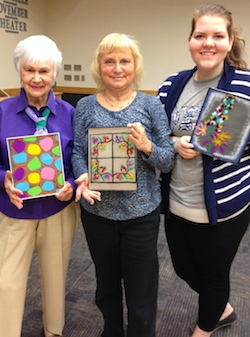Background & Foundational Pillars
 It’s no secret that ageism is prevalent in the United States: negative attitudes towards older adults and aging are found in younger and older generations alike. Such attitudes have been shown to reduce effective care delivery and impact long-term health outcomes for older adults. PALETTE was founded as a way to challenge these attitudes and it utilizes three foundational concepts to do so: intergenerational programming, creative engagement and interdisciplinary education.
It’s no secret that ageism is prevalent in the United States: negative attitudes towards older adults and aging are found in younger and older generations alike. Such attitudes have been shown to reduce effective care delivery and impact long-term health outcomes for older adults. PALETTE was founded as a way to challenge these attitudes and it utilizes three foundational concepts to do so: intergenerational programming, creative engagement and interdisciplinary education.
Intergenerational Programming
A successful intergenerational program is a collaborative experience, with both younger and older generations contributing to the exchange in a meaningful and deliberate manner. Such intergenerational programs can challenge stereotypes and foster new understanding between generations. By structuring its programming around the collaborative creation of art, PALETTE provides a forum for younger and older adults to build relationships in a meaningful and purposeful way.
Creative Engagement
Creative arts serve as the primary medium for PALETTE to foster intergenerational relationships and promote successful aging. With students and older adults approaching the same task of artistic expression, they are able to see each other as peers. Art can therefore serve as a natural ice breaker and a point of commonality for students and older adults to build relationships and transcend generational divides. Creative arts have further been shown to improve the physical health, mental health and social functioning of older adults (as reported in the Creativity and Aging Study).
Interdisciplinary Education
Interdisciplinary education helps students to recognize bias, think critically, and develop problem-solving skills. PALETTE utilizes interdisciplinary education as a way to engage students in the critical thinking necessary to translating their PALETTE experiences into their careers.
